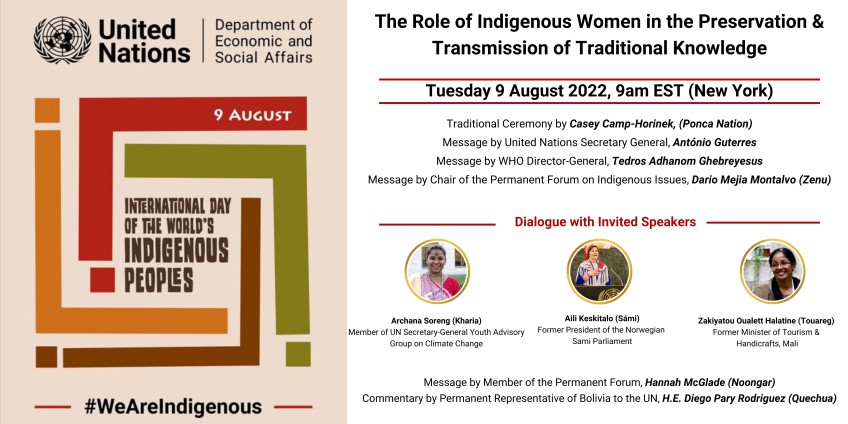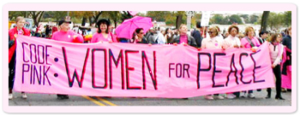International Day of the World’s Indigenous Peoples 2022

Virtual commemoration on 9 August 2022
(09-11 am EST/New York Time)
Link to Join: https://us02web.zoom.us/j/81206090975
The International Day of the World’s Indigenous Peoples is celebrated globally on 9 August. It marks the date of the inaugural session of the Working Group on Indigenous Populations in 1982. The Department of Economic and Social Affairs (DESA) is organizing a virtual commemoration of the International Day from 9 am to 11am (EST) on Tuesday, 9 August 2022, focusing on this year’s theme: “The Role of Indigenous Women in the Preservation and Transmission of Traditional Knowledge”. Indigenous Peoples, Member States, UN entities, civil society, and the public are all invited.
Indigenous women are the backbone of indigenous peoples’ communities and play a crucial role in the preservation and transmission of traditional ancestral knowledge. They have an integral collective and community role as carers of natural resources and keepers of scientific knowledge. Many indigenous women are also taking the lead in the defense of indigenous peoples’ lands and territories and advocating for indigenous peoples’ collective rights worldwide.
However, despite the crucial role indigenous women play in their communities as breadwinners, caretakers, knowledge keepers, leaders and human rights defenders, they often suffer from intersecting levels of discrimination on the basis of gender, class, ethnicity and socioeconomic status.
Indigenous women particularly suffer high levels of poverty; low levels of education and illiteracy; limitations in the access to health, basic sanitation, credit and employment; limited participation in political life; and domestic and sexual violence. Besides, their right to self-determination, self-governance and control of resources and ancestral lands have been violated over centuries.
Small but significant progress has been made by indigenous women in decision-making processes in some communities, achieving leadership in communal and national roles, and stood on the protest frontlines to defend their lands and the planet’s decreasing biodiversity. The reality, however, remains that indigenous women are widely under-represented, disproportionately negatively affected by decisions made on their behalf, and are too frequently the victims of multiple expressions of discrimination and violence.
This International Day of Indigenous Peoples, let’s reclaim the role of these heroines.
Spread the message with the social media material prepared by the UN Department of Economic and Social Affairs!
Format and invited speakers
The virtual commemoration will include an interactive dialogue segment with invited speakers, moderated by Ms Rosemary Lane, Acting Chief of the Indigenous Peoples Development Branch – Secretariat of the Permanent Forum on Indigenous Issues. Speakers will share their expertise and experience from their indigenous communities in preserving, reviving, retaining, and transmitting the traditional ancestral knowledge in various fields of communal activities, including but not limited to effective and sustainable climate solutions, use of natural resources, protection of biodiversity, ensuring food security, promoting native languages and culture, and managing indigenous science and medicine. Some of the questions to be discussed are:
- What is the unique position of indigenous women in the preservation and transmission of traditional knowledge?
- What are some of the brightest examples of indigenous women-led processes in solving contemporary global issues through the effective application of traditional scientific knowledge?
- How are indigenous languages crucial to the development, preservation, and transmission of indigenous cultural and knowledge systems? How are women leading the way in maintaining indigenous languages?
- What was the effect of applying indigenous scientific knowledge and medicine in alleviating the consequences of the COVID-19 epidemiologic crisis?
Panel Speakers
Archana Soreng (Kharia) – Member of UN Secretary-General’s Youth Advisory Group on Climate Change
Aili Keskitalo (Sámi) – Former President of the Sámi Parliament of Norway
Zakiyatou Oualet Halatine (Touareg) – Former Minister of Tourism & Handicrafts, Mali
Hannah McGlade (Noongar) – Member of the UN Permanent Forum on Indigenous Issues
Commentary
Commentary on Panel Discussion by His Excellency Ambassador Diego Pary Rodriguez (Quechua), Permanent Representative of Bolivia to the United Nations








